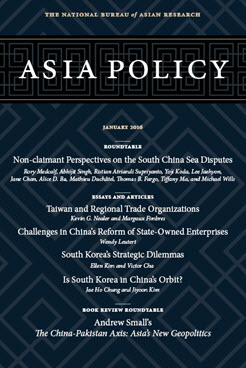Taiwan and Regional Trade Organizations
An Urgent Need for Fresh Ideas
This essay assesses Taiwan’s prospects for joining the Trans-Pacific Partnership (TPP) and recommends options for how Taiwan can overcome the challenges related to gaining membership.
EXECUTIVE SUMMARY
MAIN ARGUMENT
Taiwan is an important exporter and investor in the Asia-Pacific, but its economic role in the region is diluted by its exclusion from regional trade deals, which have increased in both number and significance. As more free trade and regional trade agreements are signed, Taiwan needs to find ways to knit itself into the region’s economic and commercial fabric. The most significant—and timely—region-wide trade liberalization deal is the TPP. For Taiwan, the benefits of TPP membership would be twofold: (1) TPP standards would necessitate broad reforms, making the island more competitive, and (2) membership would create trade diversification, thereby reducing economic dependence on the mainland. Taiwan now has an opportunity to take the necessary steps toward membership. If it does, the island will improve its competitive position in the region. But if it remains a bystander, its competitiveness will erode. TPP membership would enable Taiwan to retain and improve its status as a strong economic player in the Asia-Pacific.
POLICY IMPLICATIONS
- Taiwan should work on the TPP areas where it can achieve success, such as the services sector. This approach will allow it to build public support for more difficult reforms in agriculture and investor-state dispute settlement.
- Taiwan should not view the TPP as a competition with China. Taiwan’s membership should be considered on its own merits.
- Taiwan should engage in bilateral discussions with TPP nations—especially Japan, which has publicly supported Taiwan joining the negotiations—to explore how to reform its economy so as to be prepared for engaging in a follow-on round of negotiations for potential new members.
- Taiwan should continue to pursue closer economic cooperation with the U.S. through the trade and investment agreement framework and work to resolve outstanding issues, especially in the agriculture sector.
NOTE: The views expressed in this essay are those of the authors and do not necessarily reflect the official policy or position of any agency of the U.S. government.
About Asia Policy
Asia Policy is a peer-reviewed scholarly journal presenting policy-relevant academic research on the Asia-Pacific that draws clear and concise conclusions useful to today’s policymakers. Asia Policy is published quarterly in January, April, July, and October and accepts submissions on a rolling basis. Learn more


